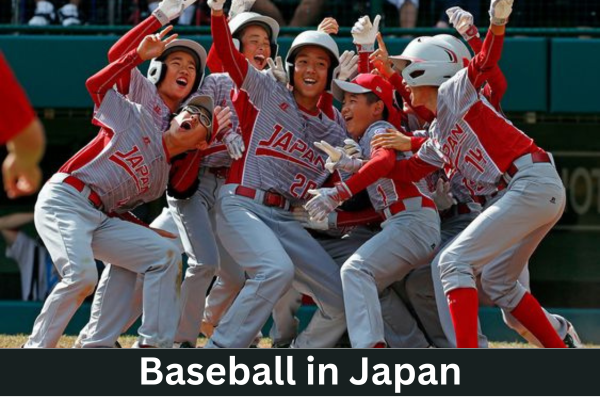 Image Credit-Pinterest
Image Credit-Pinterest
Baseball’s roots in Japan can be traced back to the late 19th century, coinciding with the Meiji era and the country’s fervent adoption of Western customs. Unlike traditional Japanese sports such as sumo wrestling and kendo, baseball brought a new dimension with its focus on cooperative team play. This marked a pivotal shift in sporting preferences, reflecting Japan’s openness to Western influences during a period of significant societal transformation.
While sumo and kendo were deeply ingrained in Japanese tradition, baseball provided a fresh and team-oriented alternative that resonated with the changing times. The sport’s introduction during the Meiji era laid the foundation for its enduring popularity, establishing a connection between modernization and the emergence of a national sporting identity.
What set baseball apart was its alignment with core Japanese cultural values. The game became more than just a sport; it became a conduit for instilling discipline, hard work, and perseverance – values deeply embedded in the Japanese work ethic. Unlike the individualistic nature of sumo wrestling and kendo, baseball championed cooperative play and strategic thinking, mirroring the evolving societal ethos.
The shift from traditional Japanese sports to baseball mirrored broader cultural changes. Baseball was not merely a form of entertainment; it became a character-building exercise that aligned seamlessly with Japan’s strong work ethic. This alignment laid the groundwork for baseball to transcend its status as a foreign import and become an integral part of Japan’s cultural fabric.
Also Read: Ernie Banks Legacy
Post-War Boom and Media Influence
American Influence Post-World War II
The post-World War II era marked a significant turning point for baseball in Japan, as American influence played a pivotal role in shaping the sport’s trajectory. With the arrival of American occupation forces, baseball became a symbol of cultural exchange and collaboration. The enthusiastic promotion of the sport by American GIs laid the groundwork for its widespread acceptance.
The infusion of American baseball culture into Japan was not merely a sporting phenomenon; it became a cultural bridge, fostering understanding and connection between the two nations during the post-war period. This period of influence not only introduced the game itself but also planted the seeds for the establishment of professional leagues and a new era for Japanese baseball.
Establishment of Professional Leagues and the Impact of American GI’s
The post-war years witnessed the establishment of professional baseball leagues in Japan, a direct result of the enthusiastic reception and promotion by American occupation forces. The adoption of a professional structure transformed baseball from a recreational activity to a highly organized and competitive sport.
The impact of American GIs went beyond the playing field; it extended to the broader culture of Japanese baseball. Their support and promotion not only fueled the establishment of professional leagues but also ingrained a passion for the sport among the Japanese population, creating a lasting legacy that continues to shape the baseball landscape in Japan.
The allure of baseball in Japan deepened with the introduction of American baseball legends, including iconic figures like Babe Ruth, Lou Gehrig, and Joe DiMaggio. Exhibition games featuring these legends became cultural events, drawing massive crowds and further solidifying the connection between Japanese audiences and the sport.
The presence of these legends not only elevated the level of play but also contributed to the cultural exchange between the two nations. Their impact resonated far beyond the baseball diamond, leaving an indelible mark on the perception and appreciation of the sport in Japan. The influence of these legends continues to echo in the passion and reverence with which baseball is embraced in the country.
Unique Aspects of Japanese Baseball
Japanese baseball distinguishes itself with a unique emphasis on pitching and defensive strategies. Unlike some Western counterparts that may prioritize power-hitting, Japanese teams often focus on meticulous pitching techniques and strategic defensive play. This nuanced approach adds a layer of complexity and excitement, attracting fans who appreciate the strategic intricacies of the game.
The commitment to excellence in pitching reflects a dedication to precision and strategy, creating a brand of baseball that values the artistry of the sport as much as its athleticism. This distinctive approach has contributed to the development of top-tier pitchers and has become a hallmark of Japanese baseball excellence.
The annual National High School Baseball Championship, affectionately known as “Koshien,” stands as a cultural phenomenon in Japan. This tournament captivates millions of viewers, with high school teams from across the nation competing for glory. Beyond the pursuit of a championship title, “Koshien” holds profound cultural significance, shaping the dreams of young players and serving as a springboard to professional careers.
The intense competition, coupled with the fervent support from fans and communities, elevates “Koshien” beyond a mere sporting event. It becomes a stage where aspirations are realized, and the next generation of baseball stars emerges, further cementing the tournament’s place in Japanese baseball lore.
Japanese baseball’s enduring popularity is fueled by extensive media coverage and a vibrant fan culture. Dedicated TV channels, newspapers, and websites provide comprehensive coverage, keeping fans engaged and informed. This constant presence of baseball in the media landscape ensures that the sport remains a focal point of public interest.
The fan culture adds another layer to the baseball experience in Japan. Elaborate cheers, colorful costumes, and unique rituals contribute to the lively atmosphere in stadiums. Fans passionately support their teams, creating an interactive and spirited environment that transcends the boundaries of the playing field. This fusion of media influence and enthusiastic fan engagement makes every baseball game in Japan a memorable and collective experience.
Also Read: Ultimate Guide to Walk-Off Wins
Team Loyalty and Fan Engagement
Japanese Fans’ Unwavering Loyalty to Teams and Players
Japanese baseball stands as a testament to the unwavering loyalty of its fans. Supporters forge deep connections with their favorite teams and players, creating a bond that goes beyond the realms of sport. This allegiance often lasts a lifetime, with fans remaining steadfast through victories and defeats.
The dedication of Japanese fans is palpable in the vibrant team colors adorning caps and jerseys. It extends to objects like colorful rally towels, balloons, and even mini-umbrellas waved in the air. The visual spectacle of fans proudly displaying their team’s colors is a manifestation of the profound loyalty that permeates Japanese baseball culture.
Deep Connection Between Fans and the Sport
Japanese baseball transcends being a mere pastime; it forms the cornerstone of lifelong bonds between fans and the sport. Whether passed down through generations within families or cultivated through shared experiences with friends, the love for baseball becomes a shared cultural inheritance.
The emotional investment in the sport fosters a sense of community and camaraderie. Attending a baseball game is not just a spectator sport; it’s a communal experience where fans come together to celebrate victories and support each other through defeats. This deep connection underscores the enduring significance of baseball in Japanese society, making it more than a game – it’s a shared journey that unites generations and fosters a sense of belonging.
Focus on Entertainment
In Japan, attending a baseball game transcends the realm of traditional sports; it becomes a holistic entertainment experience. The stadiums are not just venues for athletic competition but vibrant hubs of excitement and engagement. Beyond the diamond, fans are treated to a spectacle that combines the thrill of the game with various forms of entertainment.
The atmosphere in Japanese baseball stadiums is electric, with fans actively participating in organized cheers and chants. The collective energy of the crowd adds an infectious fervor to the overall experience. This emphasis on creating an immersive and entertaining atmosphere distinguishes Japanese baseball games from their counterparts in other parts of the world.
Japanese baseball stadiums go the extra mile to ensure a memorable outing for fans. The offerings extend beyond the game itself, encompassing a diverse array of food and beverage options. From traditional snacks to modern culinary delights, the stadium becomes a culinary destination, catering to a wide range of tastes.
Between innings, the entertainment continues with lively performances and engaging activities. From mascot antics to fan competitions, the breaks in the game are filled with dynamic and entertaining interludes. This intentional focus on keeping the audience engaged contributes to the festive atmosphere, making a day at the ballpark a complete and enjoyable experience for fans of all ages.
This blend of athletic competition, spirited fan engagement, and a commitment to entertainment solidifies baseball’s position as more than just a sport in Japan—it’s a celebration of culture and community.
Also Read: Decoding Baseball Evolution
In Crux
In conclusion, the popularity of baseball in Japan is intricately woven into the fabric of the nation’s history, culture, and societal evolution. The sport’s journey, from its introduction during the Meiji era to its post-war boom and ongoing cultural significance, reflects a complex interplay of historical forces and shifting cultural values.
The embrace of baseball during a period of Western influence and its subsequent integration into the Japanese way of life underscore the dynamic relationship between tradition and modernity. The sport’s ability to adapt while retaining its core values has allowed it to become a symbol of continuity in the face of societal change.
Beyond the athletic prowess displayed on the field, baseball in Japan is a unique blend of athleticism, drama, and cultural significance. The emphasis on teamwork, discipline, and strategic play mirrors the values ingrained in Japanese society. The sport’s evolution, from a foreign import to an integral part of Japanese culture, speaks to its ability to resonate with the ethos of the nation.
As fans cheer on their teams in unison, waving colorful towels and immersing themselves in the collective experience, baseball becomes a shared journey that transcends generations. It’s not merely a game; it’s a cultural touchstone that fosters a sense of community and connection. Baseball in Japan, with its rich tapestry of history and passionate fanbase, continues to be a source of inspiration, entertainment, and pride.
How much did you like this From the Diamond: The Psychology Behind Catchers’ Third Base Throws, please share your view in the comment box, also share this blog with your friends on Social Media so they can also enjoy this blogs for more blogs visit baseballpropicks.com
Related Article –

Meet Daniel Anderson, the heart and soul behind Baseball Pro Picks. At 49, Daniel’s life has revolved around baseball, a passion that’s as strong today as it was when he first fell in love with the game. Living in the USA, Daniel has dedicated countless hours to watching, analyzing, and understanding every pitch, hit, and home run, making almost no game missed. His deep-rooted love for the sport is matched only by his commitment to sharing insightful, expert analysis with fellow baseball enthusiasts. With decades of experience and a keen eye for the game’s nuances, Daniel brings a unique perspective that enriches Baseball Pro Picks. Trust Daniel to guide you through the intricacies of baseball with the authority and trustworthiness of a true aficionado.












